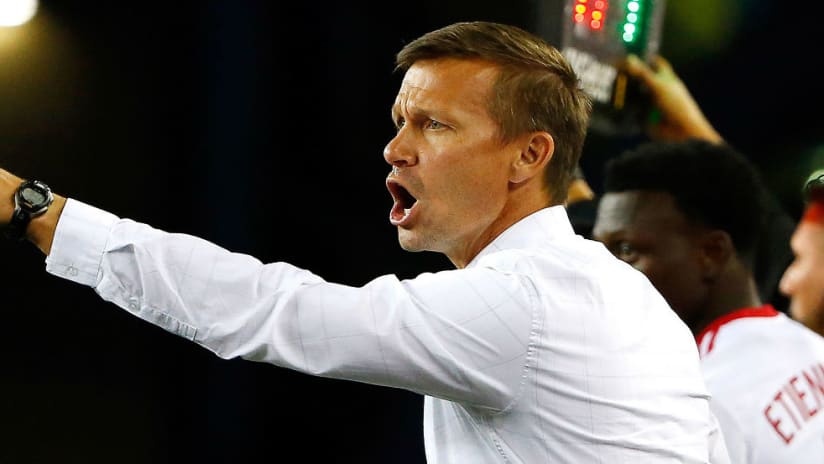For the first time in MLS history, five coaches have been fired by their clubs in the middle of the 2017 season.
Jeff Cassar (Real Salt Lake), Dominic Kinnear (San Jose Earthquakes), Curt Onalfo (LA Galaxy), Pablo Mastroeni (Colorado Rapids), and now Jay Heaps (New England Revolution) have all received the axe this year. Cassar was the first to get the boot in March.
The firings reflect a new reality in MLS: There’s more pressure on coaches now than at just about any other time since the league first kicked off in 1996.
New York Red Bulls head coach Jesse Marsch spoke about the increased pressure on managers around the league in his notable interview with ESPN’s Taylor Twellman during the broadcast of his team’s 1-1 draw against NYCFC last month.
“It’s the reality of our league becoming more prominent and more important,” Marsch told Twellman. “Now with the money that investors are putting in, there’s always going to then be more pressure.”
Marsch has it exactly right. For MLS managers, more money means more pressure.
Increased funds that have poured into the league in recent years – some in the form of higher salaries and transfer fees paid to attract bigger-name Designated Players, some in the form of Targeted Allocation Money, and more still in the form of bulked-up academies. They've unquestionably made the league better -- and they've also unquestionably raised the stakes at just about every club.
As they put more of their money into their teams, owners understandably want to see more of a return. A poor run of results that may have been tolerated when MLS was in a less-developed stage can now leave a manager without a job. We saw that with Onalfo, who, despite having a host of high-priced stars with him in LA, couldn’t coax any sort of consistency out of the Galaxy.
It’s not just results, either. Vision and identity are playing an increasingly important role in how managers are being evaluated by their bosses. Take Kinnear, for instance. He was dismissed by San Jose on June 25, one day after a 2-1 home win against Real Salt Lake put the Quakes in fifth in the Western Conference at the time. Their 6-6-5 record at the time of his departure wasn’t anything to get too excited about, but it seemed about right for the Quakes’ talent level.
Obviously, that’s not how first-year GM Jesse Fioranelli saw things. Fioranelli spoke this winter about wanting to bring a more attacking style of play to San Jose, and he felt he wasn’t getting that under Kinnear. San Jose currently still sit at fifth in the West but they are finding more time for young attackers Tommy Thompson and Jackson Yuiell and playing in a more forward-facing fashion.
Mastroeni was undone by similar forces in Colorado. The Rapids’ results were bad enough on their own to merit a change, but, according to club sporting director and interim GM Padraig Smith, the reluctance to break out of his familiar defensive posture did Mastroeni in just as much as Colorado’s poor record did.
Every firing can be debated on its own individual merits, but, on the whole, I think the added pressure on MLS managers is a good thing. Nothing creates progress like a little heat, and a new crucible for head coaches should only lead to more innovation, faster growth and better overall practices for every MLS team.













